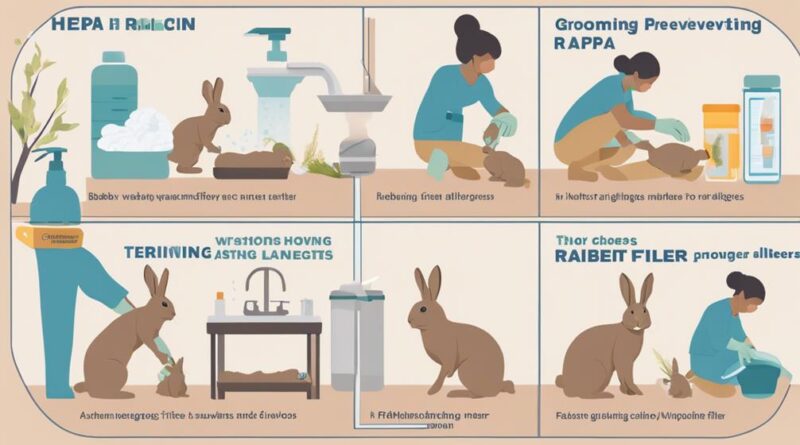Top 10 Ways to Prevent Rabbit Allergies
To prevent rabbit allergies, create a rabbit-free zone at home. Use a HEPA filter vacuum and wash hands after handling rabbits. Invest in an air purifier with a HEPA filter and groom your rabbit regularly to reduce shedding. Opt for hypoallergenic bedding like paper-based pellets or hay, cleaning it frequently. Minimize dander exposure by grooming your rabbit and using air purifiers. Ensure a dust-free environment by cleaning with a HEPA filter vacuum and using dust mite-proof covers. Improve air quality and handle rabbit waste properly. Limit contact with rabbits and consult an allergist for tailored advice. Consider medication for allergy relief. More tips available.
Understanding Rabbit Allergens
Understanding Rabbit Allergens is crucial for individuals sensitive to these small animal proteins. Allergen sources can be found in rabbit fur, saliva, and urine. These allergens are proteins that trigger an immune response in susceptible individuals, leading to symptoms such as sneezing, coughing, itchy eyes, and skin rashes. Prevention methods are essential for managing rabbit allergies effectively.
To reduce exposure to rabbit allergens, it's recommended to create a designated rabbit-free zone in your home, especially in bedrooms. This can help minimize contact with allergens, providing a safe space for individuals with sensitivities. Regular cleaning is also vital in controlling allergens. Vacuuming carpets, rugs, and furniture with a HEPA filter vacuum can help remove rabbit dander effectively. Additionally, washing your hands after handling rabbits and avoiding touching your face can prevent allergen transfer.
Investing in an air purifier with a HEPA filter can help capture airborne allergens, improving indoor air quality. It's crucial to groom your rabbit regularly to reduce shedding and dander. Proper grooming practices, which will be discussed in detail later, can significantly decrease allergen levels in the environment. Understanding the sources of rabbit allergens and implementing appropriate prevention methods are key to managing rabbit allergies effectively.
Proper Rabbit Grooming Practices
To maintain optimal health for your rabbit and reduce allergen levels in your environment, implementing proper grooming practices is essential. Rabbit shedding is a natural process that can contribute to increased allergens in your home. Regularly brushing your rabbit is key to managing shedding and reducing the spread of allergens. When selecting a brush, opt for a soft-bristled brush that's gentle on your rabbit's skin but effective in removing loose fur. Brushing techniques should be gentle yet thorough, ensuring you cover the entire coat to collect loose fur before it ends up scattered around your living space.
Start brushing from the head and work your way down to the tail, following the direction of hair growth. Be mindful of sensitive areas like the belly and hindquarters, adjusting your pressure accordingly. Aim to brush your rabbit at least a few times a week, increasing the frequency during shedding seasons. By incorporating regular grooming sessions into your rabbit care routine, you can help minimize allergens in your home and keep your rabbit's coat healthy and shiny. Remember, a well-groomed rabbit isn't only happier and healthier but also contributes to a more allergy-friendly environment for you.
Allergy-Friendly Rabbit Bedding
When selecting rabbit bedding, prioritize materials that are hypoallergenic and dust-free to minimize allergen exposure in your living space. Hypoallergenic bedding options are essential for creating allergen-free rabbit habitats. Opt for bedding made from materials such as paper-based pellets, aspen shavings, or hay, as these options are less likely to trigger allergic reactions compared to cedar or pine shavings which can release more dust and volatile oils.
Paper-based bedding is a popular choice for those with rabbit allergies, as it's highly absorbent, virtually dust-free, and unlikely to cause respiratory issues. Aspen shavings are another excellent hypoallergenic option, providing a soft and comfortable bedding for your rabbit while minimizing allergens in the environment. Additionally, hay can be used both as bedding and food for your rabbit, offering a natural and hypoallergenic choice.
It's crucial to regularly clean and replace the bedding to maintain an allergen-free habitat for your rabbit. A clean living environment can significantly reduce the presence of allergens and help alleviate allergic reactions. By choosing hypoallergenic bedding materials and practicing good hygiene habits, you can create a safe and comfortable space for both you and your rabbit.
Minimizing Rabbit Dander Exposure
To reduce your exposure to rabbit dander, regularly grooming your rabbit will help minimize the amount of dander in their fur and environment. Pet dander control is crucial in managing allergies related to rabbits. Grooming your rabbit at least twice a week can significantly reduce the shedding of dander. Use a brush specifically designed for rabbits to remove loose fur and dander effectively. Additionally, bathing your rabbit occasionally can help reduce dander levels, but be cautious as excessive bathing can strip their skin of natural oils.
Incorporating air purifiers into your home can also aid in reducing rabbit dander in the air. High-efficiency particulate air (HEPA) filters are particularly effective in trapping airborne particles like dander. Place air purifiers in rooms where you and your rabbit spend the most time to improve air quality.
When cleaning your rabbit's living area, opt for allergy-safe cleaning products to minimize the chances of triggering allergic reactions. Vacuuming with a HEPA filter vacuum cleaner can help remove dander from carpets and upholstery. Ensuring proper ventilation in your home can also help in reducing the concentration of dander in the air. Open windows when possible or use exhaust fans to improve air circulation and decrease dander buildup. By implementing these strategies, you can create an environment that's more conducive to managing rabbit allergies.
Creating a Dust-Free Environment
Creating a dust-free environment is essential in minimizing potential allergens that can exacerbate rabbit allergies. Dust mites are common indoor allergens that can trigger allergic reactions in sensitive individuals, including those with rabbit allergies. To control dust mites and improve indoor air quality, there are several strategies you can implement.
Begin by regularly dusting and vacuuming your home, focusing on areas where dust tends to accumulate, such as carpets, rugs, curtains, and upholstered furniture. Use a vacuum cleaner equipped with a HEPA filter to effectively capture tiny dust particles and prevent them from being recirculated into the air. Additionally, consider using dust mite-proof covers for pillows, mattresses, and box springs to create a barrier against these microscopic pests.
Maintaining optimal humidity levels in your home can also help reduce dust mite populations. Aim to keep indoor humidity below 50% to deter dust mites from thriving. Using a dehumidifier in damp areas can assist in controlling moisture levels and inhibiting dust mite growth.
Furthermore, regularly washing bedding, curtains, and other fabrics in hot water (above 130°F) can help eliminate dust mites. Be diligent in cleaning and decluttering your living spaces to minimize dust accumulation and improve overall indoor air quality, creating a healthier environment for both you and your rabbit.
Regular Air Filtration
Implementing regular air filtration systems can significantly reduce airborne allergens in your home, aiding in the prevention of rabbit allergies. Air purifiers and ventilation systems are essential tools in maintaining clean air quality. Air purifiers work by filtering out particles such as pet dander, dust mites, and other common allergens that can trigger allergic reactions. By circulating air through a series of filters, air purifiers can trap these microscopic particles, preventing them from recirculating in your living spaces.
When choosing an air purifier, opt for one with a HEPA (High-Efficiency Particulate Air) filter. HEPA filters are designed to capture 99.97% of particles that are 0.3 microns or larger in size, making them highly effective in reducing airborne allergens.
In addition to using air purifiers, ensuring proper ventilation in your home is crucial for minimizing allergens. Good ventilation helps to remove stale air and replace it with fresh, clean air from outside. Opening windows regularly, using exhaust fans in bathrooms and kitchens, and installing air exchange systems can all contribute to better indoor air quality.
Managing Rabbit Waste Safely

To address another significant aspect in preventing rabbit allergies, proper handling and disposal of rabbit waste is essential to maintain a clean and allergen-free living environment. Safe disposal of rabbit waste is crucial in minimizing allergens in your home. It's recommended to wear gloves and a mask while cleaning the rabbit's litter box or cage to prevent direct contact with the waste. Use a dedicated scooper for removing solid waste and replace litter frequently to reduce odor and allergen buildup. Consider using litter made from paper or compressed hardwood pellets as they can help control odors better than traditional clay litter.
When disposing of rabbit waste, seal it in a plastic bag before placing it in the outdoor trash bin to prevent allergens from spreading inside your home. Regularly clean and disinfect the litter box or cage to prevent the buildup of allergens and bacteria. Proper ventilation in the area where the rabbit waste is kept can also help in reducing odors and maintaining air quality.
Additionally, consider placing the litter box or cage in a well-ventilated area away from living spaces to minimize allergen exposure. Proper waste management not only helps in preventing rabbit allergies but also contributes to a cleaner and healthier living environment for both you and your pet.
Limiting Contact With Rabbits
Limit your direct physical interaction with rabbits to reduce the risk of developing allergies. Rabbit interaction is a significant factor in triggering allergic reactions. When you touch rabbits, allergens present in their dander, saliva, and urine can easily transfer to your skin and clothes. These allergens can then become airborne, leading to respiratory issues like sneezing, coughing, or even asthma symptoms in sensitive individuals.
To limit rabbit interaction, consider designated areas for your rabbits that are off-limits for you, especially in your bedroom or other frequently used spaces. If possible, have a non-allergic family member or friend take on tasks that involve direct contact with the rabbits, such as grooming or cleaning cages. If you must handle the rabbits, wear gloves and a mask to minimize contact with allergens.
Additionally, avoid letting rabbits roam freely in your living areas to reduce the spread of allergens. Regularly clean their living spaces, wash your hands thoroughly after any contact, and change your clothes if they've come into contact with the rabbits. These precautions can significantly decrease your exposure to allergy triggers associated with rabbit interaction. By being mindful of your contact with rabbits, you can help prevent the development or worsening of rabbit allergies.
Consulting an Allergist

Consider scheduling an appointment with an allergist to discuss your rabbit allergies and explore effective management strategies. Allergists are specialized physicians who can help you better understand your specific allergic reactions to rabbits and provide personalized recommendations for managing your symptoms. During your consultation, the allergist will likely inquire about your medical history, conduct allergy testing to confirm your sensitivity to rabbits, and offer guidance on ways to minimize exposure to allergens.
One key aspect that your allergist may discuss is implementing a rabbit-friendly diet. Some individuals with rabbit allergies may find relief by avoiding certain foods that can exacerbate their symptoms. Your allergist can provide you with detailed information on dietary adjustments that may help alleviate your allergic reactions.
Furthermore, based on the outcomes of your allergy testing and consultation, the allergist will offer tailored recommendations to help you manage your rabbit allergies effectively. These recommendations may include tips on creating an allergen-free environment, using air purifiers, and implementing proper cleaning routines to reduce allergen exposure.
Medication and Allergy Relief
Effective management of rabbit allergies often involves utilizing medications and allergy relief strategies tailored to your specific symptoms and sensitivities. When it comes to addressing rabbit allergies, there are various options available to help alleviate your symptoms and improve your quality of life.
- Over-the-Counter Antihistamines: These medications can help relieve itching, sneezing, and runny nose caused by rabbit allergies. They work by blocking the action of histamine, a substance in the body that contributes to allergic symptoms.
- Nasal Corticosteroids: These sprays can reduce inflammation in your nasal passages, helping to relieve congestion, sneezing, and runny nose. They're often used as a long-term treatment for persistent allergy symptoms.
- Decongestants: If you experience nasal congestion due to rabbit allergies, decongestants can help shrink swollen nasal tissues and blood vessels, making it easier to breathe.
- Allergy Shots (Immunotherapy): For severe allergies that don't respond well to other treatments, allergy shots may be recommended. These shots contain a tiny amount of the allergen (in this case, rabbit dander) and can help your body build up immunity over time.
In addition to medications, alternative therapies and herbal remedies can sometimes offer relief for mild allergy symptoms. Furthermore, lifestyle changes such as keeping rabbits out of your bedroom and dietary adjustments like consuming anti-inflammatory foods may also help manage rabbit allergies effectively.
Frequently Asked Questions
Can Rabbit Allergies Develop Suddenly Without Prior Exposure?
Yes, rabbit allergies can develop suddenly without prior exposure. Allergic reactions to rabbits may include symptoms like sneezing, itching, and skin rashes.
Treatment options often involve avoiding contact with rabbits, using antihistamines, and in severe cases, seeking medical attention.
Prevention strategies include keeping rabbits out of living areas, regular cleaning, and using air purifiers to reduce allergens. It's essential to be mindful of potential triggers and take necessary precautions.
Are There Any Hypoallergenic Rabbit Breeds Available?
If you're considering getting a rabbit but have concerns about allergies, allergy testing can help determine if you're sensitive to rabbit dander.
While no rabbit breed is completely hypoallergenic, some breeds like Rex or Mini Lop may produce fewer allergens.
Creating a rabbit-friendly home with regular grooming, air purifiers, and keeping the living space clean can also help minimize allergy symptoms.
Can Children With Allergies Safely Interact With Rabbits?
When it comes to managing allergies in children, interacting with rabbits requires precautions. Ensure that your child's allergy is well-controlled before allowing them to spend time with rabbits.
Supervise interactions closely and teach your child to wash their hands after touching the rabbit. Consider consulting with an allergist to discuss potential risks and safe practices for rabbit interaction.
How Do I Know if My Rabbit Is the Cause of My Allergies?
If you suspect your rabbit is causing your allergies, allergy testing can confirm this. Symptoms like sneezing, itchy eyes, and skin rash may indicate a rabbit allergy. Treatment options include antihistamines or allergen immunotherapy.
To ensure your rabbit's care isn't compromised, consult an allergist for guidance. Regular cleaning of your rabbit's living space and minimizing direct contact can also help reduce your exposure to allergens.
Is It Possible to Outgrow Rabbit Allergies Over Time?
Yes, it's possible to outgrow rabbit allergies over time. Allergy testing can help confirm this change in your body's response. Factors like genetic predisposition and immunity play roles in this process.
Treatment options can also aid in managing and potentially reducing rabbit allergy symptoms. Monitoring your symptoms and consulting with a healthcare provider can provide insights into the progression of your allergies.
Conclusion
In conclusion, by implementing proper grooming practices, using allergy-friendly bedding, and creating a dust-free environment, you can significantly reduce rabbit allergies.
It's important to manage rabbit waste safely, limit contact with rabbits, and consult an allergist for personalized advice.
Additionally, medication and allergy relief options are available to help alleviate symptoms.
By following these top 10 ways to prevent rabbit allergies, you can enjoy the company of your furry friend while minimizing the risk of allergic reactions.
